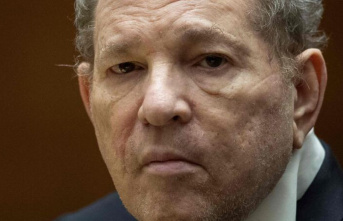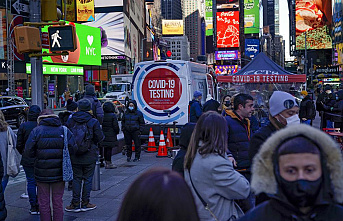Earl Gray, Kim Potter's lawyer, countered that Wright was not a criminal when she pulled her Taser instead of her Taser from Brooklyn Center.
"No one is perfect in the journey of life. Gray stated that everyone makes mistakes. Gray said, "My goodness, a mistake doesn't constitute a crime. It's not allowed in this freedom-loving nation.
The majority of the jury was mostly white and began deliberating just before noon. They then stopped for the day at 6 p.m., without reaching a decision. They will remain sequestered until their verdict is reached. Potter, a white man, was charged with first-degree and second-degree murder in the April 11 shooting. This happened after Wright was stopped for expired license plates and an air freshener hanging from Wright's rearview mirror.
During her summation, Erin Eldridge, the prosecutor, stated that Wright's death could have been prevented. It was completely avoidable. She said that claiming it was a mistake is not an argument. She also pointed out that jury instructions don't include the words "accident" or "mistake".
Eldridge stated that accidents can still be considered crimes if they are the result of reckless or culpable neglect.
Eldridge stated, "She drew an extremely deadly weapon." She aimed it. "She pointed it at Daunte's chest and fired.
Gray claimed that Wright was the "cause of the whole incident" as he attempted to flee police officers during a traffic stop. Potter said that he mistakenly took her Taser and grabbed her gun.
He stated that Daunte Wright was responsible for his death.
Potter, 49, said Friday that she "didn’t want to hurt anyone," that it was "sorry that it happened", and that she can’t recall what she said or all that transpired after the shooting. As much as she has of those moments, "is missing."
Monday's Eldridge statement stated that it wasn't about Potter being sorry.
She said, "Of course she feels guilty about what she did." She said, "But that does not belong in your deliberations."
Eldridge played Potter's video from the body camera frame-by-frame. She wanted to question Potter's account that she fired her testimony after seeing fear on the face of another officer (then-Sgt. Mychal Johnson was trying to handcuff Wright while he was sitting in the passenger-side car door.
According to the defense, Johnson was in danger of being dragged. Potter would have been justified using deadly force if necessary. Eldridge reminded jurors that Potter was behind another officer she was training and that Johnson did not come into the camera's view until after firing the shot. Then it showed the top half of his head as he backed off.
"Sgt. Eldridge stated that Johnson wasn't afraid to be dragged. Eldridge said that Johnson never claimed he was afraid. He didn't tell it at the time, and he didn’t testify to it in court.
Jurors wrote a Monday afternoon note to the judge asking for the date Potter would speak with Laurence Miller (a psychologist who testified in defense). The judge informed jurors that all evidence was in and they should "rely on their collective memories." The jury returned to the room.
Potter testified with Eldridge, saying that she used her Taser because Johnson looked scared. Eldridge pointed to an inconsistency. Eldridge said that Potter told Miller she didn't understand why she used her Taser when she spoke with Miller. Potter said that she doesn't remember saying that.
Miller did not clarify this from Potter's testimony.
Eldridge also pointed out that Potter was putting other people at risk by firing her gun. She also highlighted that the third officer was so close that a cartridge casing bounced off his face.
She said, "Members the jury, safe handling a firearm doesn't include firing it into an automobile with four people directly in danger."
Gray began his final argument by attacking Eldridge’s summation. He highlighted how she had presented extremely slow-down depictions events Potter actually saw.
Gray stated, "Playing the video at a speed that makes it look chaotic and playing it as slow a possible... that is the rabbit hole for misdirection." Gray also pointed out that Potter's bodycam was attached to her chest, giving her a slightly different view than her own.
Eldridge, as prosecutors did throughout the three-week trial stressed that Potter was a 26-year-old veteran who had been "highly trained" in law enforcement and was "highly skilled" in the field. She also claimed she acted recklessly in the killing of Wright.
Eldridge stated that "She made a series omissions that led her to shooting and killing Daunte Wayne." This was not a small oopsie. This was not about putting the wrong date on an invoice. ... This was a huge mistake. This was a mistake of epic proportions.
Eldridge stated that while there is always a risk when an officer stops a vehicle, it didn't justify Potter using her gun against Wright. He pulled away from her and the other officers, as she was trying to arrest him for an outstanding weapons possession warrant.
Eldridge stated that the case was not about Daunte Frank Wright. "Daunte is not on trial. He is not the reason that we are here today.
Eldridge also dismissed testimony from other officers that described Potter as a person of integrity or stated they did not see any wrong in her actions. "The defendant has been in trouble, and her police family is there for her back."
The death of Wright sparked angry protests in Brooklyn Center for several days. The incident occurred as Derek Chauvin (a white officer) was being tried in Minneapolis for the murder of George Floyd.
Jurors were told by Judge Regina Chu that intent was not part of the charges. The state does not have to prove Wright's death.
To prove first-degree murder, the judge ordered that prosecutors prove that Potter caused Wright’s death by recklessly handling a firearm. They must prove that Potter committed a deliberate or intentional act while using or handling a firearm that created a substantial or unjustifiable danger that she was aware and disregarded and that she endangered safety.
The state must prove second-degree manslaughter. This means that she was knowingly able to cause death or great bodily injury.
The state sentencing guidelines allow for just under seven years imprisonment for first-degree manslaughter convictions and four years for second degree, although prosecutors say they intend to seek longer sentences.












